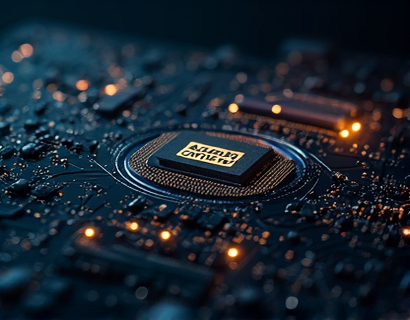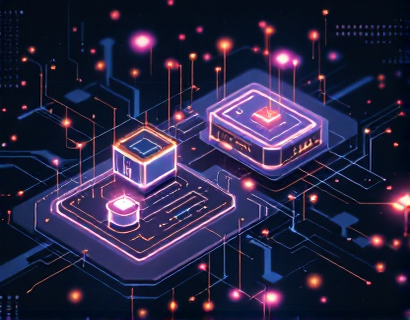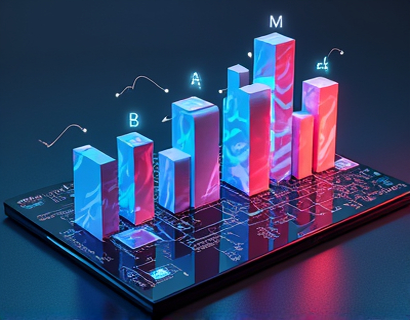Blockchain Oracle Management: Enhancing Decentralized Applications with Advanced Data Integration and Smart Contract Solutions
In the rapidly evolving landscape of blockchain technology, the role of oracles emerges as a critical component for connecting decentralized applications (DApps) with external data sources. This article delves into the innovative software solutions that are transforming oracle management, focusing on how these advancements enhance data integration and smart contract capabilities. By optimizing these processes, developers and businesses can unlock the full potential of blockchain, ensuring real-time, secure, and reliable interactions within DApps.
Understanding Oracle Management in Blockchain
Oracle management in blockchain refers to the process of integrating external data and services into blockchain networks. Oracles act as intermediaries, providing trustworthy data to smart contracts, which are self-executing contracts with the terms directly written into code. The reliability and accuracy of this data are paramount, as any inaccuracies can lead to flawed execution of smart contracts. Traditional oracle solutions often face challenges such as latency, security vulnerabilities, and limited data sources, hindering the seamless operation of DApps.
Challenges in Traditional Oracle Solutions
One of the primary challenges with traditional oracle solutions is the latency involved in data retrieval and transmission. Blockchain networks require timely data to function effectively, and delays can result in outdated information being used in smart contracts. This can be particularly problematic in applications like decentralized finance (DeFi), where real-time data is crucial for transactions and lending processes. Additionally, security remains a significant concern, as oracles can become targets for malicious attacks, potentially compromising the integrity of the entire blockchain ecosystem.
Another challenge is the limited diversity of data sources. Many traditional oracles rely on a narrow set of data providers, which can lead to a lack of variability and reliability. This limitation restricts the scope of data that smart contracts can access, thereby limiting the functionality and utility of DApps. To address these issues, innovative software solutions have emerged, focusing on enhancing data integration and smart contract capabilities.
Innovative Software Solutions for Oracle Management
Recent advancements in software solutions have introduced more robust and efficient methods for managing oracles and accessing blockchain-based services. These solutions aim to streamline data integration, reduce latency, and enhance security, thereby unlocking the full potential of blockchain technology. One key aspect of these solutions is the implementation of decentralized oracle networks, which distribute data sourcing across multiple nodes, reducing the risk of single points of failure and increasing data reliability.
Decentralized oracle networks utilize a consensus mechanism to aggregate data from various sources, ensuring that the information fed into smart contracts is accurate and up-to-date. This approach not only improves the speed of data retrieval but also enhances the security of the oracle system. By leveraging blockchain's inherent properties, such as transparency and immutability, these networks provide a trustless environment where data providers and consumers can interact without intermediaries.
Data Integration and Real-Time Updates
Effective data integration is a cornerstone of advanced oracle management solutions. These platforms employ sophisticated algorithms and protocols to gather data from a wide range of sources, including APIs, databases, and IoT devices. The integration process is designed to be seamless and automated, allowing DApps to access real-time data without manual intervention. This capability is particularly valuable in dynamic environments where data changes frequently, such as in financial markets or supply chain management.
For instance, in the context of DeFi, real-time data integration enables more accurate pricing and risk assessment. By accessing up-to-date market data, smart contracts can execute trades and manage assets with greater precision, reducing the likelihood of losses due to outdated information. This real-time capability also enhances user trust, as participants can have confidence in the data-driven decisions made by the DApp.
Enhancing Smart Contract Functionality
Beyond data integration, advanced oracle management solutions significantly enhance the capabilities of smart contracts. By providing reliable and diverse data inputs, these solutions enable smart contracts to perform complex operations that were previously impractical or impossible. For example, in decentralized gaming, smart contracts can use real-time data from external sources to dynamically adjust game parameters, create more engaging experiences, and ensure fair play.
In the realm of supply chain management, smart contracts can leverage real-time data to track the movement of goods, verify authenticity, and ensure compliance with regulatory standards. This level of integration not only improves efficiency but also builds transparency and trust among all stakeholders involved. The enhanced functionality of smart contracts, powered by robust oracle management, opens up new possibilities for innovation across various industries.
Security and Trust in Oracle Networks
Security remains a top priority in the development of oracle management solutions. To address potential vulnerabilities, these platforms implement multi-layered security protocols, including encryption, access controls, and regular audits. Decentralized oracle networks, in particular, benefit from the distributed nature of blockchain, as the risk of a single point of failure is significantly reduced. This distribution ensures that even if one node is compromised, the overall integrity of the network remains intact.
Furthermore, these solutions often incorporate reputation systems and incentivization mechanisms to encourage reliable data provision. Data providers who consistently supply accurate and timely information are rewarded, while those who fail to meet standards are penalized. This approach fosters a community-driven model where the quality of data is maintained through collective effort and mutual accountability.
Use Cases and Industry Applications
The applications of advanced oracle management solutions span across multiple industries, each benefiting from the enhanced data integration and smart contract capabilities. In the financial sector, DeFi platforms can leverage these solutions to create more robust lending and borrowing protocols, ensuring that interest rates and loan terms are based on real-time market data. This leads to more efficient capital allocation and reduced risk for all participants.
In the Internet of Things (IoT), oracle management solutions enable seamless communication between devices and blockchain networks. Smart contracts can automatically trigger actions based on sensor data, such as adjusting energy consumption in smart homes or managing inventory in industrial settings. This level of automation not only improves operational efficiency but also reduces the need for manual oversight.
In the realm of digital identity verification, oracle management solutions can integrate with external identity providers to ensure that user identities are accurately and securely verified within DApps. This enhances user privacy and control over personal data, while also complying with regulatory requirements.
Future Prospects and Developments
As blockchain technology continues to mature, the role of oracle management solutions will become increasingly critical. Future developments are likely to focus on further reducing latency, expanding the range of data sources, and enhancing the interoperability between different blockchain networks. The integration of advanced technologies such as machine learning and artificial intelligence can also play a significant role in optimizing data processing and prediction capabilities within DApps.
Moreover, the growth of cross-chain solutions will necessitate more sophisticated oracle management systems capable of handling data across multiple blockchains. This will enable more seamless interactions and data sharing between different blockchain ecosystems, fostering a more interconnected and efficient decentralized landscape.
Conclusion
In conclusion, innovative software solutions for oracle management are revolutionizing the way decentralized applications interact with external data and services. By addressing the challenges of latency, security, and data diversity, these solutions enhance the reliability and functionality of smart contracts, unlocking the full potential of blockchain technology. As the ecosystem continues to evolve, the importance of robust oracle management will only grow, driving further innovation and adoption across various industries.










































